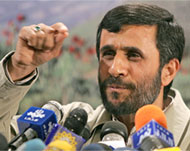Diplomats fail to agree on Iran
The political stand-off over Iran’s nuclear ambitions continues as an international meeting to discuss a possible referral to the UN Security council failed to produce an agreement.

European, Russian, Chinese and US officials met in London on Monday but, according to a senior German diplomat, could not reach a consensus on the substance of a resolution referring Iran to the Security Council.
Gernot Erler, Germany’s deputy foreign minister, told German public television that the countries were still discussing what role the UN should take. He said that would be the main point of discussion at a meeting of the International Atomic Energy Agency (IAEA) planned for early next month in Vienna.
“We remain in talks about what should be decided there and what the role of the United Nations should be,” he said.
“That is a sign that we could not reach a full agreement [of] what the goal of the IAEA is through a resolution but that more time is needed.”
Israeli talks
Meanwhile in separate talks over Iran‘s nuclear strategy, a delegation of Israeli atomic and security experts was due in Moscow on Tuesday for talks with Russian officials.
An official, speaking anonymously, said: “The visit, which was set up two months ago by Prime Minister Ariel Sharon [before he suffered a brain haemorrhage] is designed to enable an exchange of views and information on the state of play with Iran‘s nuclear programme.”
The delegation includes Giora Eiland, the national security adviser, and Gideon Frank,the head of the country’s atomic energy commission.
The official said the “working visit” was a follow-up to a trip two months ago to Washington by Tzahi Hanegbi, a cabinet minister without portfolio, where a dormant strategic dialogue with the United States was renewed.
Russia has offered to enrich uranium for Iran to allay international concern over Tehran‘s nuclear ambitions.
Moscow has close ties with the Iranian leadership and is building Iran‘s first nuclear power station at Bushehr, but has expressed concern at Iran‘s plans to resume nuclear research.
Enemy number one
Israel has come to view the regime in Tehran as its number-one enemy, and its fears were heightened after comments in October from Mahmoud Ahmadinejad, the Iranian president, when he called for the Jewish state to be “wiped off the map”.
 |
|
Ahmadinejad’s tough stance has |
Israeli officials have played down the idea of a pre-emptive strike against Iran‘s nuclear facilities, but Aharon Zeevi, the outgoing head of military intelligence, said last month that such action was “not impossible”.
Israel is widely believed to be the only nuclear power in the Middle East, although it has never admitted to possessing nuclear weapons.
Iran meanwhile lifted its ban on CNN on Tuesday, after it received an apology for misquoting Ahmadinejad. A translation error meant that CNN quoted Ahmadinejad as talking about “nuclear weapons” rather than “nuclear technology” during a press conference.